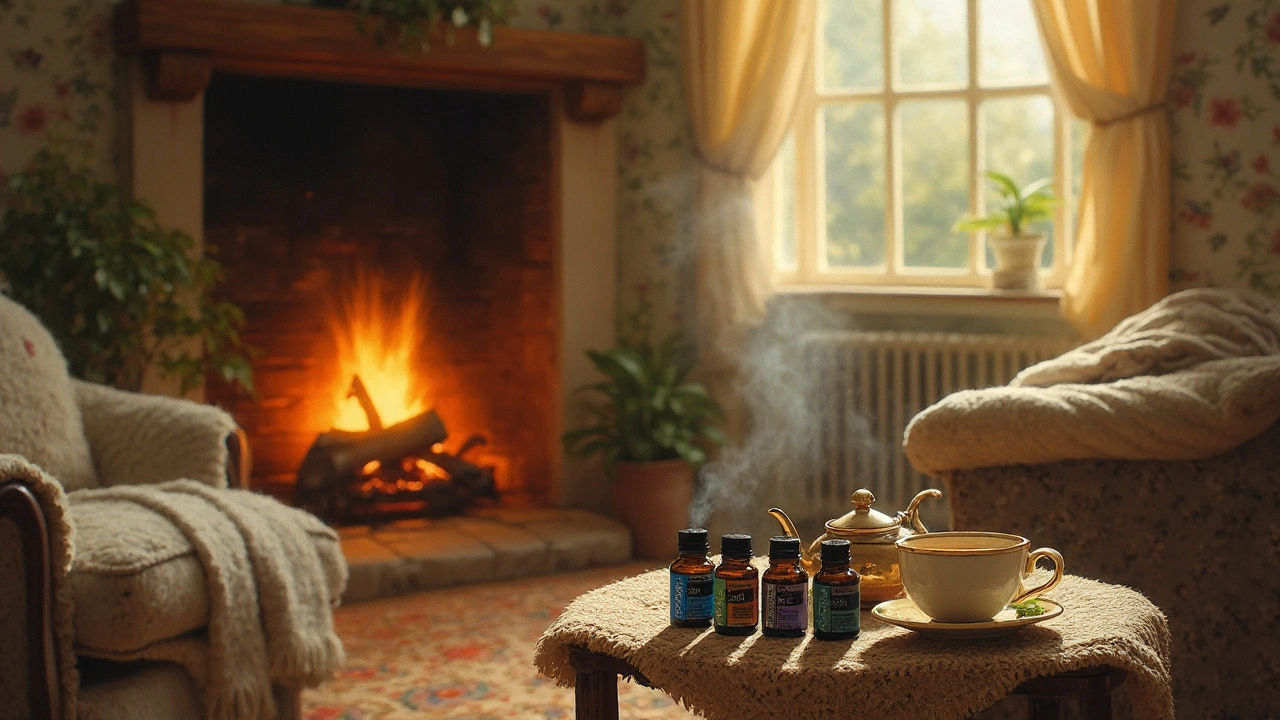Ever caught yourself in the grips of a cold, wishing for a magic cure? While aromatherapy might not be magic, it's a pretty brilliant natural solution when battling those annoying symptoms. Imagine breathing in refreshing scents while they work their wonders on your congestion and sore throat.
Essential oils like eucalyptus, peppermint, and tea tree are superstars in the aromatherapy world, each packing its punch against various cold and flu woes. Eucalyptus, for example, is famous for its ability to relieve stuffy noses by opening up nasal passages. Meanwhile, peppermint might be your best bet for soothing headaches thanks to its cooling effect.
Now, knowing which oils to grab is just the start. Aromatherapy is all about technique. Breathing them in through a diffuser or applying them (diluted, please!) to the skin can make a world of difference. Who wouldn't want to curl up with a cozy blanket and let these scents go to work?
- Understanding Aromatherapy
- Essential Oils for Cold and Flu
- How to Use Essential Oils Safely
- The Science Behind Aromatherapy
- Additional Natural Remedies to Consider
Understanding Aromatherapy
Aromatherapy might sound fancy, but at its core, it's all about using essential oils to improve your well-being. These oils are basically plant extracts that capture the plant's scents and flavors, a.k.a. their 'essence'. Imagine having the power of nature in a tiny bottle!
The world of aromatherapy is vast, with each essential oil offering its unique benefits. They can freshen the air, boost mood, and even help with health issues like cold and flu. It's no wonder folks have been using them for centuries.
How Does Aromatherapy Work?
When you inhale these oils, they interact with your olfactory system—fancy term for the part of your body responsible for smell. This triggers brain responses that can affect emotions and physical health. Crazy, right?
But it's not just about smell. Applying diluted oils to the skin allows them to be absorbed, delivering their benefits directly to areas that need it.
- Inhalation: Use a diffuser or sniff directly from the bottle.
- Topical Application: Mix with a carrier oil and rub on skin.
Why Choose Aromatherapy?
For those wary of popping pills at every sneeze, aromatherapy offers a natural alternative. It's a gentle way to boost your body's healing processes. Plus, many people find the act of diffusing oils calming and relaxing—something we all need more of!
One study reported that using lavender oil improved sleep quality for 80% of participants. Another showed that peppermint oil decreased headache symptoms for 60% of sufferers. Numbers like these highlight how promising aromatherapy can be.
Essential Oils for Cold and Flu
When you're bogged down by a cold or the flu, reaching for natural remedies can bring both relief and comfort. Enter the world of essential oils, which are basically concentrated plant extracts. They're not a replacement for medicine, but they can definitely make you feel a bit better!
Superstar Oils
Let's start with some oils that are top picks for managing cold and flu symptoms:
- Eucalyptus Oil: Known for its crisp, fresh aroma, eucalyptus is a go-to for clearing up nasal congestion. It works by breaking down mucus and has anti-inflammatory properties.
- Peppermint Oil: Famous for its cooling sensation, peppermint not only helps with stuffy noses but also with headaches. A couple of drops in a bowl of hot water can be inhaled to clear your sinuses.
- Tea Tree Oil: This is your buddy if you're looking to fight off bacteria. Its antimicrobial properties can inhibit the growth of germs, giving your immune system a fighting chance.
- Lemon Oil: Feeling sluggish? Lemon oil might give a much-needed energy boost, thanks to its uplifting scent. It's great for freshening the air and lifting your spirits.
Safe Usage
These oils are great, but you gotta use them right. Safety first! Most essential oils need to be diluted before they touch your skin. Mix a couple of drops with a carrier oil like coconut or jojoba oil. Steaming and diffusing are good no-contact methods. Just a few drops in water, and let a diffuser do its magic.
| Oil | Best For | Application Method |
|---|---|---|
| Eucalyptus | Congestion | Steam inhalation |
| Peppermint | Headache | Diffusion, topical (diluted) |
| Tea Tree | Antimicrobial | Diffusion, topical (diluted) |
| Lemon | Energy boost | Diffusion, topical (diluted) |
Realistic Expectations
While these oils can help soothe symptoms, they're not miracle workers. Pair them with rest, fluids, and maybe a bowl of chicken soup for best results. Also, always check for any allergies before diving in.
Remember, using essential oils effectively can transform your sick day from dreary to a bit more manageable. Give them a shot next time those sniffles sneak up!

How to Use Essential Oils Safely
While embracing aromatherapy can bring you comfort during cold and flu season, it's super important to keep safety at the forefront. Proper use avoids mishaps and ensures you get all the benefits without any unwanted surprises.
Never Use Undiluted Oils
One golden rule: never apply these potent little drops directly to your skin. Undiluted essential oils can cause irritation or even burns. Instead, mix them with a carrier oil like coconut or jojoba. A good ratio is usually 3-5 drops of essential oil per one teaspoon of carrier oil.
Patch Test First
Not sure if your skin will react? Always do a patch test. Just put a small amount of the diluted mix on a small patch of your skin and wait for 24 hours to check for any irritation.
Diffuser Use
Diffusers are your friend when it comes to safely inhaling those healing scents. Add a few drops of your chosen essential oil, fill your diffuser with water, plug it in, and let the aroma fill your space. Follow the manufacturer's instructions because each diffuser is a little different.
Avoid Sensitive Areas
If you're applying diluted oils on your skin, steer clear of sensitive areas like eyes, inner ears, and broken skin. And always wash your hands well after applying.
When in Doubt, Consult
If you have specific health concerns, like being pregnant or having allergies, chat with a healthcare professional before diving into natural remedies with essential oils. Better safe than sorry!
Using these tips, you can enjoy the soothing benefits of aromatherapy without any hiccups. It's all about being careful while keeping the experience relaxing and positive.
The Science Behind Aromatherapy
You might be wondering, how can something as simple as a scent have such a profound effect on your cold and flu symptoms? It all boils down to how our brains react to essential oils. When we inhale these natural scents, they interact with our olfactory system, which is linked right to the brain’s limbic system—the area that controls emotions and memory.
How It Works
The limbic system plays a crucial role in influencing the nervous system and hormones. That’s why inhaling certain oil scents can help relax you, reduce stress, or even alleviate that annoying headache. This is known as the mind-body connection. Ever notice how smelling something pleasant can boost your mood? That's the limbic system at work.
Scientific Backing
There have been several studies showing the effectiveness of specific oils for symptoms of cold and flu. For instance, eucalyptus oil is known for its anti-inflammatory properties. A study published in 2022 highlighted how it helped reduce bronchitis symptoms by relaxing muscles in the airways.
Here's a fun fact: peppermint oil doesn’t just smell nice—it contains menthol, a compound often found in cold remedies. Inhaling peppermint can act as a decongestant, clearing out your stuffed nasal pathways.
Keep It Safe
It's super important to use these oils safely, especially since they're potent. A little goes a long way! Always dilute them with a carrier oil before applying them to your skin to avoid irritation.
Remember, while aromatherapy can be a great help for minor symptoms, it’s no substitute for seeing a healthcare professional when needed. That said, these scents can certainly be a comforting addition to your cold and flu arsenal.

Additional Natural Remedies to Consider
Feeling groggy with a cold or flu? Besides aromatherapy, there are other natural remedies that can pack a punch against those pesky symptoms.
Hydration is Key
First up, keep hydrated. Water, herbal teas, and broths are essential. Not only do they help thin mucus, but they also keep you feeling energized. Try adding a bit of lemon or honey to your tea for an extra soothing effect.
Vitamin C and Zinc: Worth the Hype
While there's always some debate, vitamin C and zinc are often recommended for boosting the immune system. They could shorten the duration of a cold. Fresh fruits such as oranges or kiwifruit are loaded with vitamin C. For zinc, nuts and seeds are great sources.
Ginger Power
Ginger is more than just a sushi companion. Known for its anti-inflammatory properties, it can help ease throat pain and congestion. Making a simple ginger tea is a breeze—slice some fresh ginger into boiling water, let it steep, and enjoy.
Steam It Up
Old school but gold—the power of steam! Facing a steaming bowl of hot water, cover your head with a towel and inhale gently. It helps in loosening mucus and refreshing your senses. You can even add a drop of essential oils like eucalyptus for an extra boost.
The Power of Rest
Last but absolutely not least, don’t underestimate the power of rest. Your body fights hard against the cold or flu, and sleep is where the magic healing happens. Make sure to give yourself some downtime.
| Remedy | Benefit |
|---|---|
| Herbal Teas | Hydrates and soothes |
| Vitamin C | Boosts immune function |
| Ginger | Anti-inflammatory |
| Steam | Relieves congestion |
| Rest | Aids recovery |
These methods can complement essential oils and bring you closer to feeling like yourself again. Remember, while these remedies are helpful, don’t hesitate to consult a healthcare provider if symptoms persist or worsen.





